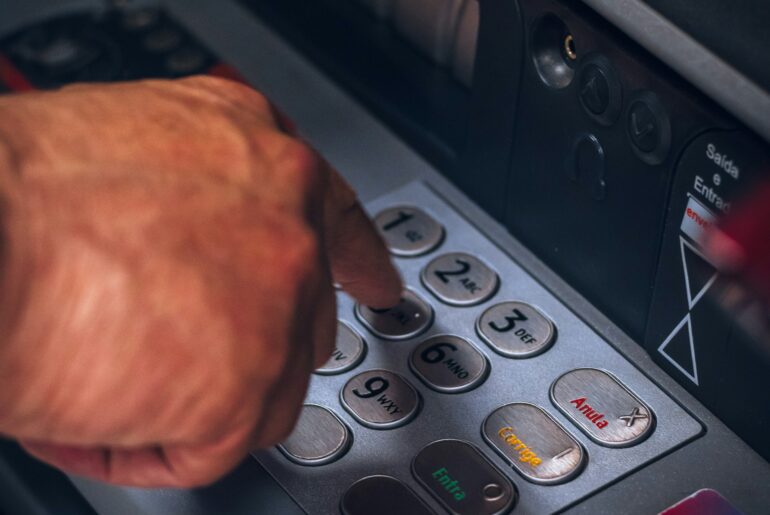This article may contain references to products or services from one or more of our advertisers or partners. We may receive compensation when you click on links to those products or services. Nonetheless, our opinions are our own.
The information presented in this article is accurate to the best of our knowledge at the time of publication. However, information is subject to change, and no guarantees are made about the continued accuracy or completeness of this content after its publication date.
People think they can always get to their money. It’s your money, after all. But sometimes, behind the scenes, banking rules, financial laws, and the law can make it hard to get to things, often at the worst times. These “quiet laws” aren’t always well known, but they can decide how quickly you can take money out, whether your accounts stay open, or even if your paycheck arrives in full. People who are on a tight budget, need to plan for emergencies, or are going through big life changes like divorce or inheritance may find these laws stressful. It talks about ten rules and habits that can make it harder to get to your own money, what those rules and habits could do, and what you can do to keep your financial freedom.
- 1. The Wait-and-See Period
- 2. Deposit Holds
- 3. Account Freezes for Suspicious Activity
- 4. Tax Liens
- 5. Child Support Garnishments
- 6. Bankruptcy Restrictions
- 7. Account Terms and Conditions
- 8. Currency Exchange Restrictions
- 9. Privacy and Data Laws
- 10. Joint Account Restrictions
- Protecting Your Access to Funds
- Conclusion
- Frequently Asked Questions
- What are “quiet laws”?
- How can probate laws delay access to funds?
- What role do bank fees play in access to funds?
- Can lease agreements affect access to money?
- How do tax liens impact bank accounts?
- What are look-back periods in financial aid?
- How do garnishment laws affect personal finance?
- What happens if an account is frozen for suspicious activity?
- Do privacy laws ever restrict access to funds?
- What’s the best way to avoid restrictions on my money?
- Recommended Reads
1. The Wait-and-See Period
Banks and financial institutions often impose a “wait-and-see” period to verify the source of newly received funds.
- Common Situations: Inheritances, home sale proceeds, large wire transfers.
- Duration: Several days to several weeks, depending on the complexity.
- Purpose: Prevents fraud, money laundering, or wrongful transfers.
| Scenario | Typical Delay | Why It Happens |
|---|---|---|
| Inheritance payout | 2 to 8 weeks | Probate verification |
| Home sale proceeds | 5 to 10 days | Fraud and lien checks |
| Large wire transfers | 3 to 7 days | AML (anti-money laundering) review |
2. Deposit Holds
Banks frequently place holds on deposited checks, especially when amounts are large or drawn from out-of-state institutions.
- Duration: 1 to 5 business days (longer for new accounts).
- Impact: Can delay bill payments or emergency expenses.
- Reason: Ensures the deposited check clears before funds are released.
3. Account Freezes for Suspicious Activity
Financial institutions are required by law to freeze accounts flagged for suspicious or potentially fraudulent transactions.
- Triggers: Unusual withdrawals, overseas purchases, or sudden large transfers.
- Resolution: Customers must submit documentation or verification.
- Consequence: Access to daily operational funds may be restricted during investigations.
4. Tax Liens
Unpaid federal or state taxes can lead to liens that allow the government to seize assets or freeze accounts.
- Scope: Bank balances, wages, and in some cases, property.
- Prevention: Timely tax payments or negotiated repayment plans.
- Risk: Immediate loss of access to liquid funds.
5. Child Support Garnishments
Courts can authorize garnishments for missed child support payments.
- Mechanism: Automatic deductions from wages or direct withdrawal from bank accounts.
- Challenge: Funds may be removed without prior notice.
- Resolution: Renegotiation of payment terms through legal channels.
Voted "Best Overall Budgeting App" by Forbes and WSJ
Monarch Money helps you budget, track spending, set goals, and plan your financial future—all in one app.
Get 50% OFF your first year with code MONARCHVIP
6. Bankruptcy Restrictions
Filing for bankruptcy triggers an automatic stay, halting most financial activities.
- Impact: Bank accounts may be frozen while the court evaluates debts and assets.
- Purpose: Protects creditors and ensures fair distribution of assets.
- Advice: Professional guidance is critical to avoid prolonged financial paralysis.
7. Account Terms and Conditions
Many restrictions are embedded in account agreements that often go unread.
- Examples:
- Withdrawal limits.
- Account inactivity penalties.
- Unexpected monthly or overdraft fees.
- Solution: Reviewing account terms before opening or updating accounts.
8. Currency Exchange Restrictions
Foreign travel and cross-border transactions may trigger unexpected regulations.
- Examples:
- Limits on the amount of foreign currency exchanged.
- Mandatory reporting of large sums when entering or leaving a country.
- Advice: Research local currency and banking laws before traveling or conducting international transactions.
9. Privacy and Data Laws
While designed to protect personal information, certain financial privacy laws may delay access to records or funds.
- Impact: Additional approvals are needed to release transaction history or contested payments.
- Result: Longer resolution times during disputes or fraud claims.
- Solution: Maintain detailed records and understand consumer rights under privacy regulations.
10. Joint Account Restrictions
Joint accounts, while convenient, can become complicated when disagreements arise.
- Scenario: One account holder withdraws most or all funds.
- Outcome: The remaining account holder may face limited access until disputes are resolved.
- Recommendation: Establish clear agreements and regularly review account activity.
Protecting Your Access to Funds
Awareness is the first step toward maintaining control.
Practical Steps
- Stay Connected: Communicate with your bank about account activity and unusual transactions.
- Review Regularly: Monitor account terms, fee structures, and changes in financial regulations.
- Seek Guidance: Engage financial advisors or legal professionals if dealing with tax liens, bankruptcy, or garnishments.
- Prepare Backup Plans: Maintain multiple accounts or emergency cash reserves when possible.
Conclusion
It’s not always as easy to get money as swiping a card or going to an ATM. It can be hard or even impossible to get money out because of quiet laws and financial protections. This can leave people without important funds at important times. These protections, such as deposit holds, tax liens, and child support garnishments, are meant to keep systems safe, but they often stress out people who have accounts. People can avoid surprises and have more control over their money by staying informed, reading the terms of their accounts, and knowing what they have to do by law. You can make sure that access to money stays easy even when laws and rules make it harder by taking proactive steps like diversifying accounts, paying taxes on time, and making sure everyone knows their responsibilities on a joint account.
Frequently Asked Questions
What are “quiet laws”?
They are lesser-known financial rules or regulations that can affect how and when individuals access their money.
How can probate laws delay access to funds?
Probate courts review and distribute assets of a deceased person. This legal process can delay inheritance payouts for months or longer.
What role do bank fees play in access to funds?
Maintenance, overdraft, or minimum balance fees can lower available balances and restrict immediate access to money.
Can lease agreements affect access to money?
Yes. Security deposits may be withheld or garnished for unpaid rent or damages, limiting access to those funds until disputes are settled.
How do tax liens impact bank accounts?
The government can place liens that freeze or seize funds until outstanding taxes are fully paid.
What are look-back periods in financial aid?
Aid applications often review finances from prior years, which may reduce eligibility if income levels were higher during that timeframe.
How do garnishment laws affect personal finance?
Both state and federal laws permit creditors to garnish wages or seize funds from accounts, reducing accessible cash flow.
What happens if an account is frozen for suspicious activity?
Banks may temporarily suspend access while investigating possible fraud. Proof of identity and documentation are required for resolution.
Do privacy laws ever restrict access to funds?
Yes. Privacy protections can slow down access to records or contested transactions, delaying reimbursements or resolutions.
What’s the best way to avoid restrictions on my money?
Monitor accounts regularly, stay current with tax and legal obligations, understand account agreements, and maintain communication with financial institutions.

Reviewed and edited by Albert Fang.
See a typo or want to suggest an edit/revision to the content? Use the contact us form to provide feedback.
At FangWallet, we value editorial integrity and open collaboration in curating quality content for readers to enjoy. Much appreciated for the assist.
Did you like our article and find it insightful? We encourage sharing the article link with family and friends to benefit as well - better yet, sharing on social media. Thank you for the support! 🍉
Article Title: 10 Quiet Laws That Can Block You From Accessing Your Own Money
https://fangwallet.com/2025/09/04/10-quiet-laws-that-can-block-you-from-accessing-your-own-money/The FangWallet Promise
FangWallet is an editorially independent resource - founded on breaking down challenging financial concepts for anyone to understand since 2014. While we adhere to editorial integrity, note that this post may contain references to products from our partners.
The FangWallet promise is always to have your best interest in mind and be transparent and honest about the financial picture.
Become an Insider

Subscribe to get a free daily budget planner printable to help get your money on track!
Make passive money the right way. No spam.
Editorial Disclaimer: The editorial content on this page is not provided by any of the companies mentioned. The opinions expressed here are the author's alone.
The content of this website is for informational purposes only and does not represent investment advice, or an offer or solicitation to buy or sell any security, investment, or product. Investors are encouraged to do their own due diligence, and, if necessary, consult professional advising before making any investment decisions. Investing involves a high degree of risk, and financial losses may occur including the potential loss of principal.
Source Citation References:
+ Inspo
There are no additional citations or references to note for this article at this time.












































